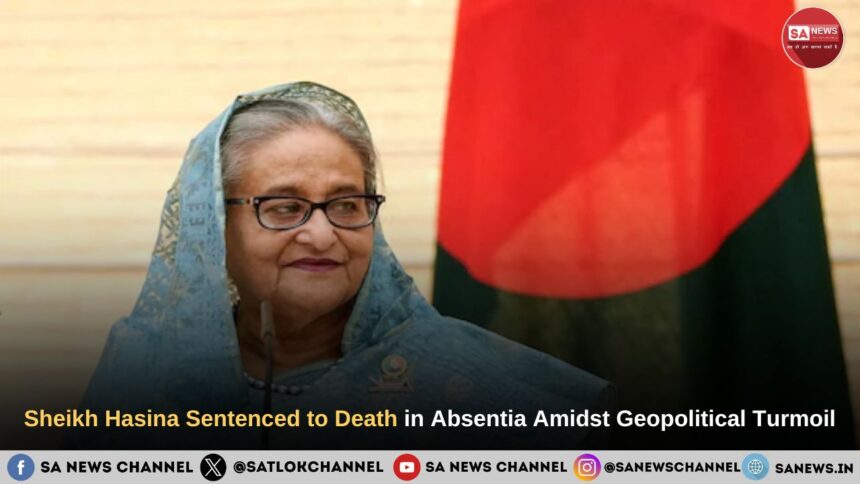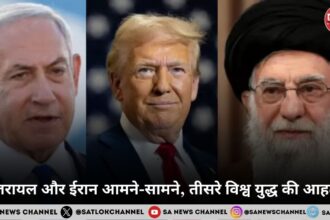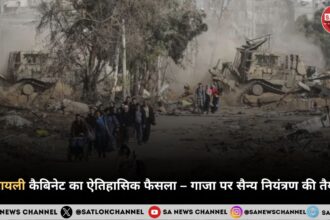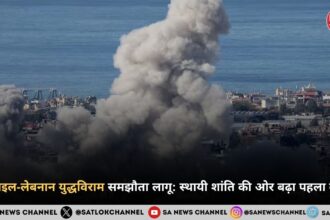November 17, 2025 In a courtroom heavy with history and irony, the International Crimes Tribunal (ICT), the very judicial body established by Sheikh Hasina in 2010 to purge her political enemies, pronounced a death sentence on the former Prime Minister herself.
The verdict marks the definitive legal climax of the “Monsoon Revolution,” the student-led uprising of mid-2024 that dismantled fifteen years of authoritarian rule. For a woman who once styled herself as the “Daughter of the Nation,” this judgment is a total repudiation of her legacy, transforming her from the architect of modern Bangladesh into a fugitive convicted of crimes against humanity.
The Judgment of History
Sheikh Hasina, now 78, remains in exile in India, where she has resided since her dramatic flight from Dhaka over a year ago. Justice Golam Mortuza Mozumder, leading the three-member tribunal, delivered the unanimous 453-page judgment. The court found Hasina guilty of orchestrating a “systemic attack” against civilians, specifically citing the “July Massacre” of 2024 which resulted in an estimated 1,400 deaths.
The tribunal did not mince words. It characterized the crackdown not as a law-and-order operation, but as an act of “extermination.” Alongside Hasina, her former Home Minister Asaduzzaman Khan Kamal was also sentenced to death in absentia. In a twist that sealed the prosecution’s case, the former Inspector General of Police, Chowdhury Abdullah Al-Mamun, turned state witness. His testimony provided the “smoking gun,” direct accounts of orders from the highest levels to suppress the protests at any cost, earning him a reduced sentence of five years.
The Summer of Blood: Anatomy of the 2024 Uprising
To understand the ferocity of the verdict, one must revisit the sweltering summer of 2024. What began as a localized agitation against job quotas metastasized into a national revolution, fueled by a single, fatal rhetorical error.
In mid-July 2024, facing swelling crowds of students, Prime Minister Hasina disparagingly referred to the protesters using the term “Razakar,” a loaded slur referring to the traitors of the 1971 Liberation War. It was a miscalculation of historic proportions. The youth of Bangladesh, facing bleak economic prospects and chafing under years of suffocating governance, did not see themselves as traitors, but as the new freedom fighters.
The state’s response was brutal. The tribunal’s judgment detailed harrowing incidents that constitute the core of the “crimes against humanity” charge. The verdict highlighted the killing of student activist Abu Sayeed in Rangpur, who was shot by police while standing unarmed with his arms outstretched, an image that became the icon of the resistance. More gruesomely, the court examined the “Ashulia Body Burning” incident of August 5, where security forces were found to have piled the bodies of six victims into a van and set them on fire to destroy evidence.
Also Read: Saudi Arabia Bus–Tanker Crash on 17 November 2025: 42 Indian Pilgrims Lose Their Lives
Evidence presented during the trial confirmed the deployment of military-grade assets against the populace. The use of helicopters and drones to fire upon civilian crowds was cited by the judge as proof that the operation was executed under “superior command responsibility,” implicating Hasina directly.
Read about when Bangladesh Tribunal Indicted Sheikh Hasina: A Deep Dive into the Crisis. To understand the full crisis in detail.
The Great Irony of the Tribunal
Legal observers cannot ignore the Shakespearean irony of the proceedings. Sheikh Hasina created the ICT in 2010 to try the perpetrators of the 1971 genocide. For years, her government used the tribunal to systematically decimate the leadership of the opposition Jamaat-e-Islami party. Critics often accused the court of procedural flaws and political bias.
In 2025, the Interim Government led by Nobel Laureate Dr. Muhammad Yunus utilized that exact same machinery to prosecute Hasina. To facilitate the trial, the government even amended the International Crimes (Tribunals) Act to allow for trials in absentia a legal weapon forged to bypass the deadlock of her exile. While the verdict offers catharsis to the families of the victims, international human rights bodies, including Human Rights Watch, have flagged concerns. They argue that trials in absentia, regardless of the defendant’s notoriety, fail to meet the rigorous standards of the International Covenant on Civil and Political Rights.
The Delhi Dilemma: A Diplomatic Standoff
The death sentence has placed the Indian government in an excruciating diplomatic bind. Sheikh Hasina was New Delhi’s most reliable strategic partner in the region, a bulwark against insurgency and a guarantor of connectivity.
Immediately following the verdict, Dhaka formally requested Hasina’s extradition, citing the 2013 Extradition Treaty between the two nations. However, the treaty contains loopholes that New Delhi is expected to leverage. Article 6 allows for the refusal of extradition if the offense is of a “political character.” While Bangladesh argues that mass murder cannot be political, India views the charges as the result of a regime change.
Furthermore, Article 8 permits refusal if the request is deemed not to be in the “interests of justice.” India can point to the procedural criticisms of the trial, specifically the denial of Hasina’s chosen counsel to justify shielding her.
The Indian Ministry of External Affairs has adopted a strategy of calculated ambiguity, noting the verdict but refusing to commit to a course of action. The reality is stark: extraditing Hasina would be viewed domestically as a betrayal of a loyal ally, potentially chilling relations with other regional partners. Refusing, however, risks permanently alienating the Bangladeshi public and the new administration, who have already termed the sheltering of Hasina an “unfriendly act.”
Erasing the Father to Punish the Daughter
The fall of Hasina has triggered a cultural purge that strikes at the very identity of Bangladesh. For decades, the state narrative was built around “Mujibism”, the veneration of Hasina’s father, Sheikh Mujibur Rahman, as the Father of the Nation.
In the wake of the revolution, this narrative has been violently dismantled. The verdict has emboldened a wave of iconoclasm. Statues of Mujib have been toppled across Dhaka, and the historic residence at Dhanmondi 32, once a sacrosanct museum, has faced attempted demolition by angry mobs. The Interim Government has cancelled national holidays associated with the Sheikh family, signaling a pivot toward a new national identity rooted in the “July Revolution” rather than the independence war of 1971.
Economic Realities and Global Pivots
While the political drama plays out in courtrooms and diplomatic cables, the average Bangladeshi continues to grapple with the economic cost of the revolution. The disruption of supply chains in 2024 sent inflation soaring, though it had moderated to around 9% by mid-2025. The economy is currently on life support from the IMF, with the Yunus administration implementing painful reforms to stabilize the currency and rebuild foreign reserves.
Geopolitically, the vacuum left by the collapse of the Indo-centric Awami League government is being filled by other powers. China has moved aggressively, signing major cooperation agreements with the Yunus administration and positioning itself as the primary development partner. Simultaneously, relations with Pakistan are thawing as the anti-Pakistan rhetoric of the Hasina era is discarded.
The Road Ahead
As Bangladesh looks toward the general elections tentatively scheduled for February 2026, the future remains volatile. The Bangladesh Nationalist Party (BNP) views the verdict as a vindication, while the Jamaat-e-Islami has re-emerged as a potent force. Meanwhile, the “Gen Z” leaders of the student movement have formed the National Citizen Party, demanding a complete rewrite of the constitution based on the “July National Charter.”
The death sentence of Sheikh Hasina is more than a legal decision; it is the closing of a chapter that began in 1971. It serves as a grim warning about the fragility of power built on suppression. Sheikh Hasina may be safe in a safe house in Ghaziabad, but in the eyes of the nation she ruled for two decades, she is already gone. The question now is whether Bangladesh can move beyond the cycle of vengeance to build the inclusive democracy the students bled for, or if the gallows will simply cast a new, long shadow over the country’s future.
A Glimpse Beyond The Veil
These stories are repeated all throughout history, where humans dominate and suppress other humans and then the oppressed rise and then they become the oppressors eventually. Such is the case throughout history.
Therefore, it is essential for us humans to look beyond the thinking of emotions and revenge and vengeance and focus on the true reality of existence.
That reality is explained by Sant Rampalji Maharaj, through His Satsangs ( discourses ) and books like Gyan Ganga and Jeene Ki Raah (Way Of Living). He has shown and proven through the holy books of all religions that we are living in the world of the Devil.
And so, it becomes very natural for our world to be chaotic and full of evil, He has also answered the questions like who is this Devil, why are we trapped with him, why is this information suddenly coming to light, who truly is God and how do we go beyond the veil of human suffering and existence,
He has proven through the scriptures that God is Kabir. That we live in the world of Kaal and that only the true devotion of God Kabir can lead us to True salvation.
And thus it is necessary that we as humans go beyond all our vices and all our issues and search for the true answer to pain and suffering.
Here is a glimpse into the reality of this world and how we ended up here:
FAQs
1) Sheikh Hasina Crimes Against Humanity Verdict 2025
Answer: On November 17, 2025, Bangladesh’s International Crimes Tribunal (ICT) found former Prime Minister Sheikh Hasina guilty of crimes against humanity, specifically for ordering violent crackdowns against protesters.
2) Did Sheikh Hasina Receive the Death Penalty?
Answer: Yes, the tribunal sentenced Sheikh Hasina to death in absentia for her role in the mass killings during the student-led uprising in July–August 2024.
3) Where Is Sheikh Hasina Currently Living?
Answer: As of November 2025, she is residing in exile in a safe house in the New Delhi area of India, where she fled after resigning in August 2024.
4) Will India Extradite Sheikh Hasina to Bangladesh?
Answer: While Bangladesh has officially requested her extradition, India has not agreed to hand her over and remains non-committal, likely citing political clauses in their extradition treaty.
5) Why Was Sheikh Hasina Sentenced to Death?
Answer: The death sentence was issued due to her conviction for ordering lethal force, including the use of firearms and drones, against civilians during the 2024 student protests, resulting in hundreds of deaths.









